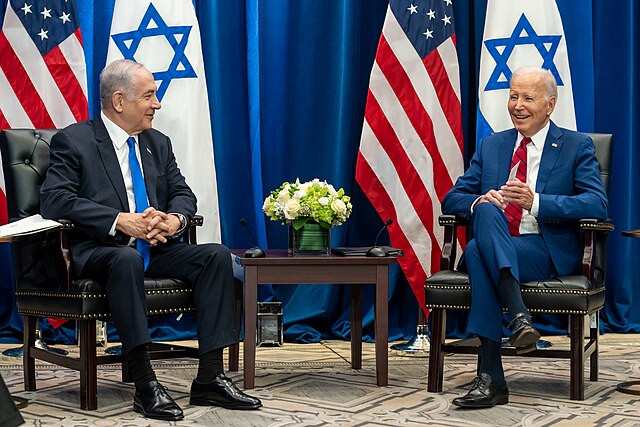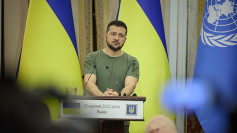U.S. President Joe Biden has called for an end to the ongoing war in Gaza and the release of hostages, signaling a significant push for diplomatic efforts as Secretary of State Antony Blinken prepares to visit Israel next week. The move follows the recent assassination of Hamas leader Yahya Sinwar by Israeli forces, a development that both Biden and Israeli Prime Minister Benjamin Netanyahu believe could change the trajectory of the conflict.
"I'm sending Tony Blinken to Israel," Biden announced on Friday morning as he arrived in Germany for meetings with leaders from France, Britain, and Germany to discuss broader geopolitical concerns, including the wars in Ukraine and the Middle East. "We're going to work out what is the day after now," he said, referring to the future of Gaza and steps to stabilize the region after Hamas's weakened position.
The death of Yahya Sinwar, the Hamas leader who orchestrated the group's cross-border attacks in 2023, marks what Netanyahu termed "the beginning of the day after Hamas in Gaza." The Israeli prime minister stressed that Sinwar's death opens opportunities for securing the release of hostages held in Gaza and "brings the end of the war closer."
While Netanyahu refrained from declaring an immediate ceasefire, Biden emphasized that it is time for the conflict to come to an end. "Now is the time to move on - move on, move towards a ceasefire in Gaza," Biden said. During a phone call with Netanyahu from Air Force One on Thursday night, Biden reiterated his stance, adding, "It's time for this war to end and bring these hostages home. And so, that's what we're ready to do."
Biden's call for a ceasefire was accompanied by congratulations to Netanyahu on the successful assassination of Sinwar. "It's a good day for the world. We got [Sinwar] - I called Bibi Netanyahu to congratulate him on getting Sinwar. He has a lot of blood on his hands - American blood, Israeli blood, and others," Biden stated, emphasizing his satisfaction with the outcome.
Sinwar's death comes after a series of Israeli assassinations targeting Hamas leaders and commanders. Khalil Al-Hayya, Hamas's deputy Gaza chief, confirmed Sinwar's death, describing him as the architect of the group's October 7, 2023, attack on Israel - the deadliest day in Israel's history in recent memory. This attack killed 1,200 people and resulted in the abduction of around 250 hostages, further fueling the already tense Israeli-Palestinian conflict.
According to Al-Hayya, Sinwar died "confronting the occupation army until the last moment of his life." Hamas reiterated its stance that no hostages taken from Israel would be released until Israel ceases its aggression on Gaza and withdraws its troops. The militant group called Sinwar a hero, with statements praising his refusal to retreat during his final moments.
In the aftermath of Sinwar's death, the U.S. and Israel are eyeing potential windows of opportunity to advance hostage negotiations. Israeli President Isaac Herzog and Prime Minister Netanyahu discussed the next steps in a meeting on Friday morning, highlighting the importance of capitalizing on Sinwar's elimination. Mossad Chief David Barnea also held consultations on how best to leverage the situation to secure a hostage deal.
Netanyahu's government has faced mounting pressure from families of the hostages still held in Gaza, with many urging him to use Sinwar's killing as leverage for renewed negotiations. Ronen Neutra, the father of Israeli-American hostage Omer Neutra, expressed hope that the situation could now shift towards resolution. "We are at an inflection point where the goals set for the war with Gaza have been achieved, all but the release of the hostages," Neutra said.
However, Hamas and Hezbollah remain resolute. Hezbollah, backed by Iran, vowed a new phase in its war with Israel, with its fighters reportedly using new types of precision-guided missiles and drones in attacks against Israeli targets. Hezbollah's statement on Friday also highlighted an explosives-laden drone strike that killed four Israeli soldiers last week.
The ongoing conflict has resulted in daily rocket fire from both Hamas and Hezbollah into Israel, escalating the violence. Netanyahu, in a speech following Sinwar's assassination, declared that "our war is not yet ended." Iran's mission to the United Nations honored Sinwar as a martyr, contrasting him with former Iraqi leader Saddam Hussein, who was captured while hiding. "When Muslims look up to martyr Sinwar standing on the battlefield - in combat attire and out in the open, not in a hideout - the spirit of resistance will be strengthened," the statement said.
With Secretary of State Blinken set to visit Israel, the U.S. is aiming to navigate the changing landscape of Gaza and push for de-escalation. Israeli officials have indicated that Blinken will discuss a comprehensive strategy for the region's stabilization, including plans for the post-Hamas governance of Gaza. Blinken has already reached out to Israeli President Herzog, as well as Qatari and Saudi counterparts, to lay the groundwork for diplomatic engagements.
The U.S. administration hopes that Blinken's visit will create momentum for a ceasefire while ensuring that humanitarian needs in Gaza are addressed. The ongoing conflict has killed over 42,000 Palestinians and displaced about 90% of Gaza's 2.3 million residents, according to local health authorities. Biden's emphasis on ending the war and securing the hostages suggests that the U.S. is keen to broker a resolution sooner rather than later, though many obstacles remain.






